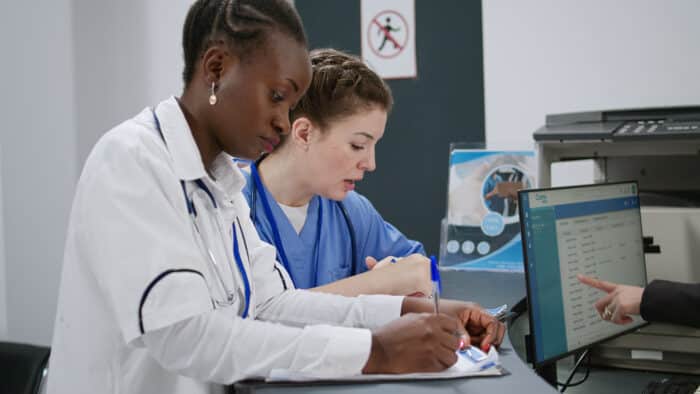Are you an aspiring Medical Biller and Coder?
Ever wondered what CBCS certification is all about? Or maybe you’re thinking about how it can enhance your career in healthcare, especially in the Medical Billing and Coding niche.
Well, you’re in luck because we’ve got all the exciting details ready for you.
From breaking down what CBCS certification is to why it’s a big deal, we’ve got you covered. Plus, we’ll also explain how to get that certification and what it means for your career.
So, if you’re ready to jump into the CBCS certification journey, let’s get started!
What is a Medical Coder? And What Do They Do?
Before we dive into the details of CBCS certification, let’s first understand the role of a medical coder.
Think of a medical coder as a language translator in the healthcare field. Their primary task is to convert complex medical information—such as diagnoses, treatments, and procedures—into a standardized code system that can be easily understood by doctors, insurance companies, and healthcare providers.
Here’s a breakdown of what medical coders do:
1. Translating Medical Information: Medical coders take detailed medical data, like physician notes and treatment specifics, and translate them into standardized codes.
2. Ensuring Accuracy: They are meticulous about accuracy, ensuring that each code precisely reflects the medical services provided. This accuracy is crucial to avoid billing errors and insurance claim rejections.
3. Adhering to Regulations: Medical coders stay updated on healthcare regulations to ensure that their coding practices comply with legal and ethical standards. This helps minimize risks for healthcare providers and ensures fair billing practices.
4. Maintaining Records: Medical coders are responsible for maintaining thorough records of procedures and treatments. These records contribute to creating a comprehensive medical history for each patient.
5. Facilitating Communication: Acting as intermediaries between healthcare providers, insurance companies, and patients, medical coders ensure smooth communication and billing processes through accurate coding. This ensures that everyone involved understands the services provided.
What is the CBCS Certification?
Now, let’s also discuss what exactly the CBCS certification is.
The CBCS (Certified Billing and Coding Specialist) certification is a professional credential that demonstrates proficiency in medical billing and coding.
It’s like a seal of approval that shows employers and clients that you have the knowledge and skills to accurately translate medical procedures, diagnoses, and treatments into standardized codes for billing and insurance purposes.
Obtaining CBCS certification involves passing an exam administered by a recognized certifying organization, such as the National Healthcareer Association (NHA) or the American Academy of Professional Coders (AAPC).
This certification opens up opportunities for employment in various healthcare settings, including hospitals, clinics, insurance companies, and medical billing companies.
Why is CBCS Certification Important?
The CBCS certification holds significant importance in the healthcare industry for several reasons:
1. Professional Validation: Achieving CBCS certification signifies to employers and clients that you have the necessary knowledge and skills in medical billing and coding. It serves as a professional validation of your expertise in this field.
2. Employment Opportunities: Many employers in the healthcare sector prefer or require candidates to hold CBCS certification when hiring for medical billing and coding positions. Having this certification can enhance your employability and open up more job opportunities.
3. Quality Assurance: CBCS certification ensures that medical billers and coders meet standardized competency levels. By adhering to recognized certification standards, healthcare organizations can maintain quality assurance in their billing and coding processes.
4. Compliance: Healthcare regulations and coding standards are constantly evolving. CBCS-certified professionals are expected to stay updated with these changes, ensuring compliance with legal and ethical standards in medical billing and coding practices.
5. Patient Care: Accurate medical billing and coding are essential for providing quality patient care. CBCS-certified professionals play a crucial role in ensuring that healthcare providers receive proper reimbursement for services rendered, which ultimately contributes to the overall quality of patient care.
How to Get the CBCS Certification?
Let’s talk about the most common dilemma now that we know about the CBCS certification: how to get it.
Obtaining CBCS (Certified Billing and Coding Specialist) certification involves several steps:
1. Meet Eligibility Requirements: Before you can sit for the CBCS exam, you need to ensure that you meet the eligibility criteria set by the certifying organization. Typically, this includes having a high school diploma or equivalent and completing a recognized medical billing and coding training program.
2. Prepare for the Exam: Once you’ve confirmed your eligibility, it’s time to prepare for the CBCS exam. This may involve self-study using exam preparation materials provided by the certifying organization, enrolling in a formal exam preparation course, or participating in online study groups.
3. Schedule and Take the Exam: After adequate preparation, you can schedule your CBCS exam with the certifying organization. The exam is usually administered at designated testing centers. Make sure to review the exam details, including the format, time limits, and required identification documents, before the exam date.
4. Pass the Exam: On the day of the exam, arrive at the testing center early and bring any required identification documents. The exam typically consists of multiple-choice questions that assess your knowledge and skills in medical billing and coding. Aim to answer each question to the best of your ability.
5. Receive Certification: Once you’ve successfully passed the CBCS exam, you’ll receive your certification from the certifying organization. This certification demonstrates your proficiency in medical billing and coding and can be used to enhance your career prospects in the healthcare industry.
6. Maintain Certification (if required): Some certifying organizations may require you to maintain your CBCS certification through continuing education or recertification exams. Be sure to familiarize yourself with any ongoing requirements to ensure that your certification remains current.
CBCS Exam Structure
The structure of the CBCS (Certified Billing and Coding Specialist) exam typically consists of the following components:
1. Multiple-Choice Questions: The majority of the exam questions are multiple-choice, where you’ll be presented with a question followed by several answer choices. The Certified Billing and Coding Specialist exam has 125 multiple-choice questions, including 100 scored items and 25 pretest items.
2. Exam Content Areas: The exam covers various content areas related to medical billing and coding. These may include:
– Healthcare Regulations: Knowledge of healthcare laws and regulations, such as HIPAA (Health Insurance Portability and Accountability Act) and Medicare/Medicaid guidelines.
– Medical Terminology: Understanding of medical terminology, abbreviations, and anatomy.
– Coding Systems: Proficiency in using coding systems such as CPT (Current Procedural Terminology), ICD-10-CM (International Classification of Diseases, 10th Edition, Clinical Modification), and HCPCS (Healthcare Common Procedure Coding System).
– Reimbursement Methods: Familiarity with different reimbursement methods, including fee-for-service, capitation, and prospective payment systems.
– Insurance Claims Processing: Knowledge of insurance claim submission processes, including claim forms, coding requirements, and claim adjudication.
3. Exam Duration: The CBCS exam is typically timed, with a set duration for completing all sections. The allotted time is usually 3 hours.
4. Passing Score: To pass the CBCS exam, you’ll need to achieve a minimum passing score as determined by the certifying organization. Questions are weighted for difficulty, so your score is more complicated than the percentage of questions answered correctly.
Out of 500 possible points, you need a “scaled score” of at least 390 to pass the exam.
5. Exam Administration: The exam is usually administered at designated testing centers approved by the certifying organization. You can take the exam either at your school, a PSI testing center near you, or through live remote proctoring at the location of your choice.
CBCS Exam Eligibility Requirements
So, if you’re eyeing to take the CBCS exam, there are two routes to qualify—through training or work experience.
If you’re taking the training route, you’ll need to wrap up a medical billing or coding program within the last five years. More on these programs a little later in the article.
On the other hand, if you’re going for the experience path, you’ll need at least a year of supervised work experience in medical billing and coding within the last three years.
And whether you’re on the training track or gaining experience, you need to still have your high school diploma or a GED. That’s one of the minimum requirements for sitting for this exam.
How Much Does the CBCS Exam Cost? How Long Does It Take?
The CBCS exam fee is around $109 unless you’ve finished a training program that offers a free exam voucher.
When it comes to the timeline for becoming certified as a medical coder, it’s not one-size-fits-all.
First off, it depends on the type of formal training you take. This could mean anything from completing an associate degree program at a university to opting for an online training course.
Once you’ve wrapped up your training, you’ll need to set aside ample time for study and preparation before tackling the exam.
The duration of this prep phase varies based on your existing knowledge and experience in medical coding. Some folks might dedicate several months to studying, while others might need less time.
Then, taking the exam and hopefully acing it on the first go. If not, you’ll have to schedule a retake, and yes, that means shelling out for the exam fee again until you clear that passing score.
Why Is Getting a Formal Training Important?
Formal training is an important aspect of CBCS certification. These programs don’t just hand you a map; they pave the way, ensuring you cover all that is needed to pass your certification exam and ace your coding career.
One good thing about formal training is its inclusive nature. This well-rounded approach sets you up with a solid foundation, so you’re ready to take on the coding world like a pro.
Another good thing about getting formal training is that it teaches you accuracy. In medical coding, precision is key, and formal training programs are important for mastering this art.
They teach you how to decode complex medical info into the perfect set of codes. With plenty of hands-on practice and expert guidance, you’ll sharpen your skills, making sure you’re on point with coding for any procedure or diagnosis.
When it’s exam time, formal training programs also help you prepare for the certification. They help you with study materials, mock exams, and insider tips from pros to get you prepped. This prep work not only boosts your confidence but also sets you up for a good performance on exam day.
Instructors often also help you gain an insight into the industry, giving you a sneak peek into what life as a coder is really like.
Now, when it comes to getting your formal training, you’ve got options:
– You can attend a technical university for an associate degree.
– Go to a community college for a diploma.
– Or complete an online training program, which is all the rage these days.
Let’s talk about why online programs are stealing the show:
1. Flexibility is important. With online training, you call the shots. Study when and where you want, no classroom is required.
2. Comfort is key. Picture yourself cozied up at home or your favorite café, getting all the knowledge in your comfiest environment.
3. Take it at your own pace. Online courses let you set the speed. Zoom through the material or take your time—it’s up to you.
4. Interactive lessons. Online platforms are packed with videos, quizzes, and interactive lessons. Plus, you can chat with instructors and classmates for extra support.
5. Save some cash. Online training can be easier on the wallet, with no commuting costs and flexible payment options.
CBCS vs CPC: Which To Choose?
Choosing between CBCS (Certified Billing and Coding Specialist) and CPC (Certified Professional Coder) certifications depends on your career goals in the medical coding field.
While both certifications are valuable, CPC certification is more common for several reasons.
Firstly, CPC certification, offered by the American Academy of Professional Coders (AAPC), is well-recognized in the healthcare industry. Employers often prefer candidates with CPC certification for coding jobs.
CPC certification focuses deeply on medical coding topics like CPT, ICD-10-CM, and HCPCS, making it perfect for coding roles.
CPC certification opens doors to job opportunities in hospitals, clinics, and insurance companies, thanks to its broad recognition.
Also, CPC certification typically leads to higher salaries due to its specialized knowledge and expertise in coding.
Additionally, CPC certification can help you advance your career by qualifying you for higher-level coding positions or leadership roles.
On the other hand, CBCS certification covers both billing and coding but may be better for roles requiring skills in both areas.
Now that you know everything about the CBCS certification and examination, you might have made up your mind on whether to choose CBCS or CPC as your chosen medical coding certification.
For that, you would first require an online training program that would help you prepare for the certification exam of your choice, and also help you set a solid foundation in the career.
We’ve got just the perfect online program for you, that can help you prepare for both the CBCS or the CPC certification, whatever you decide.
Let us introduce you to:
PREPPY’s Online Medical Coding Training Program –
where we’re not afraid to sound biased because, well, this program is pretty awesome and ticks all the boxes, and then some!
So, what makes Preppy stand out? Let’s break it down:
In Collaboration with a Top University: Preppy has partnered with the esteemed Auburn University, ensuring its training program meets the highest educational standards. That means you’re getting a top-notch education that’s nationally recognized and respected.
Get University Certification: Finish their program successfully, and you’ll walk away with a Certificate of Completion from Auburn University. It’s like a gold star on your resume, boosting your chances of landing that dream job.
Affordable Learning: Preppy gets it – money matters. That’s why they have made our program super affordable. No need to stress about student loans or financial aid – they have got you covered.
Study Anywhere, Anytime: Preppy’s program is 100% online, so you can access lectures and course materials from anywhere with an internet connection. Plus, it’s self-paced, giving you the freedom to study whenever it suits you best – perfect for busy schedules or juggling other commitments.
Preps You For Certification: Preppy is all about preparing you for success. Their curriculum is designed to get you ready for national certification exams like those from AAPC (which offers the CPC certification) or AHIMA (which offers the CCS certification). Pass those exams, and you’re on your way to becoming a certified coder.
Fast-Track Your Career: Forget about spending years in school. With Preppy, you can wrap up your training in as little as 4 months. That means you can hit the job market sooner and start making moves in your career.
Get Hands-On Experience: Preppy knows the importance of real-world experience, which is why they offer externship opportunities. It’s your chance to get your hands in actual healthcare settings, learn the ropes, and make those industry connections.
Get a Free Laptop: Enroll with Preppy, and they hand you a free laptop. Yep, you heard that right – they make sure you have all the right tools and access to the best education.
24/7 Support: From day one, Preppy is here to support you. Whether you’ve got questions, need guidance, or hit a technical glitch, Preppy’s dedicated Student Coordinator and round-the-clock support team have got your back, every step of the way.
So, what are you waiting for?
Enroll in PREPPY’s Online Medical Coding Training Program and kickstart your coding career today!
CBCS Certification FAQs
Can you take the CBCS certification exam online?
Yes, both in-person and online options are available for taking the CBCScertification exam.
Is CBCS certification important?
Yes, CBCS (Certified Billing and Coding Specialist) certification is important as it validates expertise, enhances job prospects, ensures compliance with regulations, and contributes to the accuracy of healthcare billing.
Is CBCS better than CPC?
Both CBCS and CPC certifications have their strengths and are valuable in different ways. CBCS covers both billing and coding, while CPC is more focused on coding. The choice between them depends on individual career goals and job requirements.
CPC is, however, more common and is often preferred by employers.
Is a career in medical coding worth it?
Yes, a career in medical coding is worth it for many. It offers job stability, as the demand for skilled coders remains high in the expanding healthcare industry. With flexibility in work settings and schedules, as well as opportunities for career advancement through experience and additional certifications, medical coding provides a rewarding and fulfilling career path for those interested in healthcare and detail-oriented work.
Related Resources:
Related Articles
-
How to Be Successful in College in 2022 – 7 Simple Tips to Succeed
-
How Do Scholarships Work? Read This First…Truth is Shocking
-
7 Best College Majors 2024: What Should I Major In?
-
How to Choose a College – 10 Things You Must Consider in 2024
-
Why Go to College? Top 13 Benefits for Adult Students in 2022
-
Top 5 Best Alternatives to Community College for 2024










